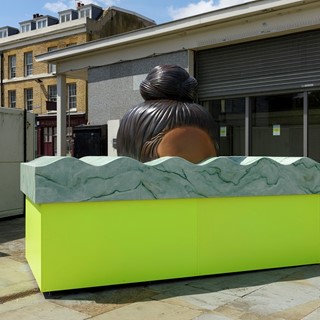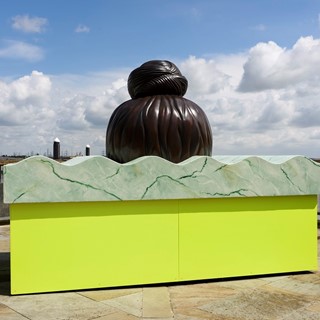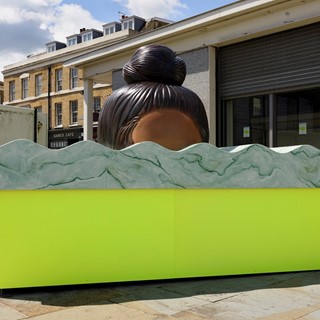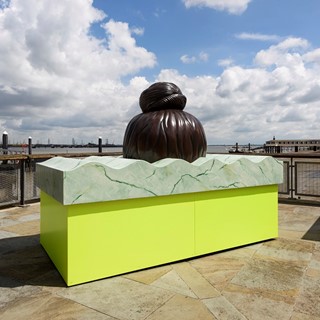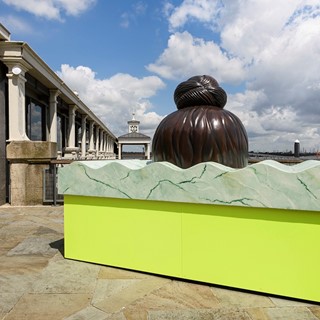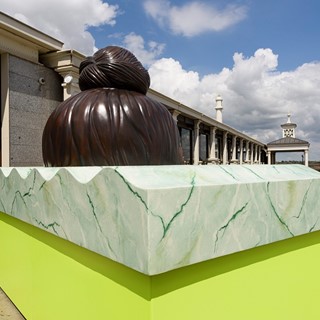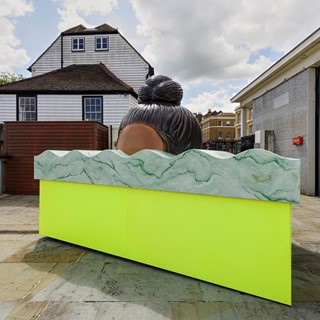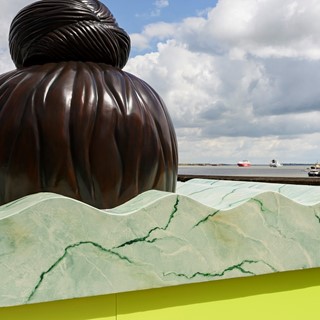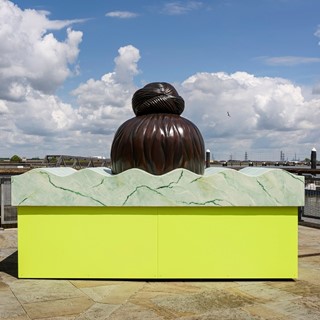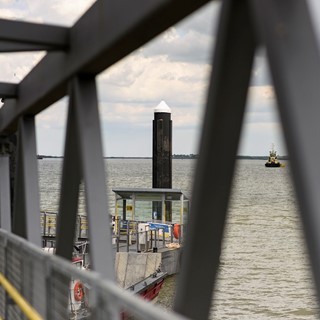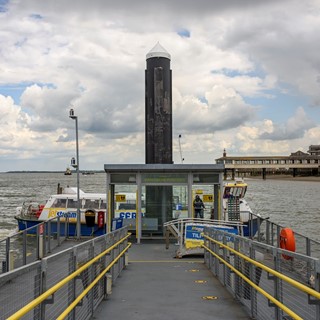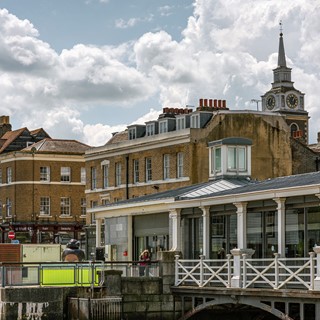Jasleen Kaur - ‘The first thing I did was to kiss the ground’ - for Gravesend
This artwork is no longer available to visit. Information on the commission is listed below.
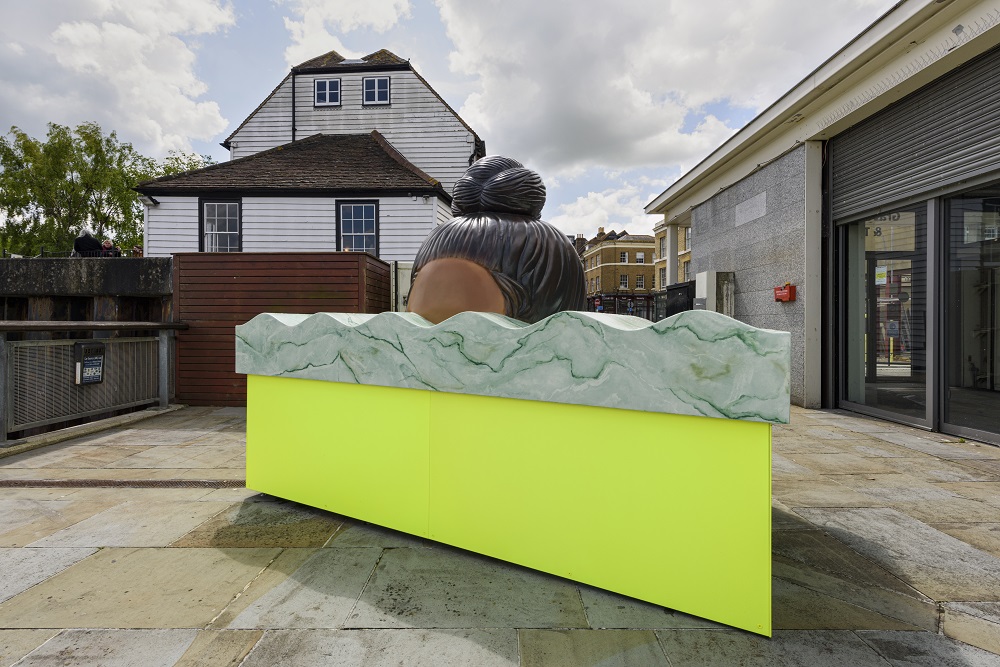
From 22 May – 12 November 2021, artist Jasleen Kaur's work ‘The first thing I did was to kiss the ground’, created with Cement Fields stood in Gravesend, as part of England's Creative Coast.
The inspiration for Kaur’s Waterfronts work is Gravesend’s rich and complex history of migration. Situated on the mouth of the Thames, the town connects London to the rest of the world. It sat opposite Tilbury Docks, the first point of disembarkation for West Indian immigrants arriving in the UK aboard the Empire Windrush in 1948, experiencing a further wave of male settlers from ex-colonies in the 1950s. Since then it has been home to a large Sikh community with whom Kaur has collaborated closely in realising her commission.
‘The first thing I did was to kiss the ground’ is a work in two parts: a sculpture and a sound-piece that were located close to one another right on the water’s edge. The sculpture is a large-scale semi-abstract form that features several components and includes a structure that resembles the top of a Sikh head including a top-knot.
The work takes its inspiration from the decorative processional ‘Palki’ floats that feature in Sikh celebrations. It represents, Kaur says, "a cognitive space ... of these other ways of thinking, these other ways of knowing.”
Its elements include multiple points of reference: a graphical weave of water is painted to look like marble, echoing the faux marble render of the nearby Gurdwara temple and the prevalence of faked veneers in migrant aesthetics; while its long top-knotted hair evokes the unassimilated Sikh identity of uncut sacred hair — often cut by early migrants to counter racism but reclaimed after Operation Blue Star in 1984, in solidarity with Sikhs in India. Kaur’s work explores the diasporic experience, allowing different cultural symbols to overlap.
Kaur’s sound-based work grew out of time she spent in the local studies archive of Gravesend library gathering information about marginalised communities, in particular feeling a kinship to the Gravesend’s Saheli Women’s culture of “supplementary schooling to learn mother tongue, prayer, thought, instruments and religious song” — things which Kaur, a third-generation Punjabi immigrant says “have scaffolded my upbringing and heritage.”
Sound work for 'The first thing I did was to kiss the ground'
Her piece explores the Saheli Women’s histories through their sound culture, working in collaboration with the sound artist Ain Bailey to conduct a series of listening workshops with members of the group. “The idea,” explains Kaur, “is that it will be a multiplicity of archival sound, gathered voices, musical text: something that has the potential of crossing over temporalities and geographies — as the individuals themselves do daily."
The work was located off land on Gravesend pier, its sounds overlapping with those of the Thames. Its stories of the Saheli women were available to listen to while moving with the water and immersed in a landscape where, Kaur says, “you feel the weight of its history....There is a small passenger ferry taking you across to Tilbury Dock, you can see the old Cruise Terminal building and the flag-post compete with Union Jack flag. So there are all these reminders, in amongst the industrial functioning landscape, of another time and place: when migration was welcomed and bound up with rehabilitating a post-war Britain.”
Jasleen Kaur’s art is an ongoing exploration into the flexibility of culture and the layering of social histories within the material and immaterial things that surround us. Her practice examines diasporic identity and hierarchies of history, both colonial and personal.
Artist biography
Jasleen Kaur was born in 1986, Glasgow, and lives and works in London. Her recent commissions include Wellcome Collection, UP Projects, Glasgow Women’s Library, Market Gallery, BALTIC Centre for Contemporary Art, Eastside Projects and Hollybush Gardens. Kaur’s work is part of the permanent collection of Touchstones Rochdale, Royal College of Art and Crafts Council.
England’s Creative Coast is led by Turner Contemporary and Visit Kent (Go To Places), funded by Arts Council England and Visit England as part of the Cultural Destinations programme and Discover England Fund, with support from the South East Local Enterprise Partnership (SELEP), East Sussex County Council, Kent County Council, Essex County Council, Visit Essex, Southend Borough Council, The Historic Dockyard Chatham and Southeastern.

